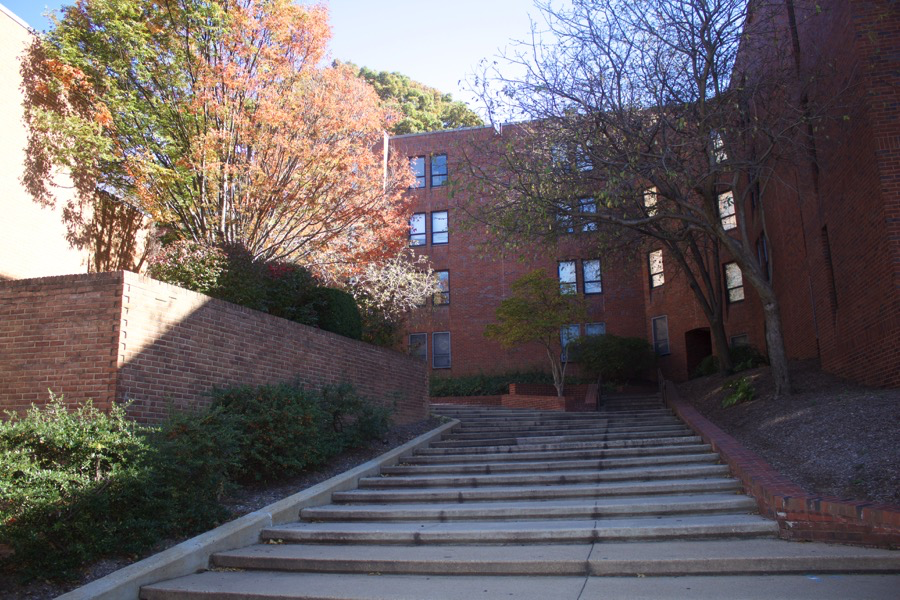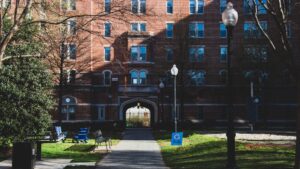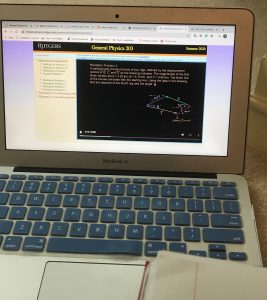When Georgetown released plans for the Fall 2020 semester on July 6, administrators assured that if health conditions permitted, students who had demonstrated the need for a safe place to live would be welcomed back to campus.
Now, some students are saying the university is breaking that promise.
Current students were invited to apply for on-campus housing based on certain circumstances such as health and safety concerns, familial instability, high financial need, or time zone challenges. Decisions were released on July 14, though international students did not receive a response until July 17. Of the over 500 applicants, only about 150 were granted housing for the fall semester, according to student reports, though the university did not provide any concrete numbers. In response to this decision, students in association with GUPride created a form seeking testimonials from those who were rejected, and plan to draft an open letter asking the administration to house more of the student applicants.
Siena Hohne (COL ’22), a former co-president of GUPride, said that when she heard only 150 spots seemed to have been reserved for students in unsafe or unstable home situations, she was instantly concerned about LGBTQ students with unaccepting parents. She, and other members of GUPride, were also confused as to why Georgetown had reserved so few spots.
“We were like hold on—why is there 150 spots for students with unsafe housing, when clearly Georgetown should have anticipated that there would be more than 150 students applying?” she asked.
“What I’m worried about is why you guaranteed freshmen a spot before you even knew how many people had unstable housing situations.”
Due to continued health concerns from COVID-19, the university will open in-person in a limited capacity this fall and is only prepared to welcome approximately 2,000 students back to campus. These students will include any members of the freshmen class (around 1,800 students) who wish to live on campus and students who participate in ROTC or academic programs that require them to be on campus. If these conditions did not apply to students, they could also apply for housing on campus within three days of the announcement.
“Priority for on-campus residence has been given to students whose personal or family situation makes it impossible or impractical to complete their studies at their permanent address,” Provost Robert Groves wrote in an email sent to the student body on July 7. “We want to make sure that every Georgetown student, regardless of their different circumstances at home, can fully engage in what we have to offer at this challenging moment.”
Qualifying circumstances for on-campus housing, according to that email and a university spokesperson, could include housing or food insecurity, safety and security concerns in a student’s current living situation, an extraordinary living situation paired with high financial need, a lack of internet accessibility, or a permanent address more than five time zones away from EST. In the application, students were asked to identify which of these circumstances, or other extenuating circumstances, applied to them and provide a short explanation.
Hohne has been helping to collect testimonies from those who were rejected, which she said includes students who applied for on-campus housing for a range of reasons. Though she originally was focused on LGBTQ students having safe housing, forwarding the information from students who were denied to the LGBTQ Resource Center, she became concerned hearing from students with other reasons for needing on-campus housing as well, ultimately pushing her to email Vice President for Student Affairs Todd Olson.
One person with narcolepsy, which is triggered by the blue light on laptops, applied so they could have someone else around to make sure they could handle the attacks. “They didn’t even know that they could apply for on-campus housing until the last minute because Georgetown did not make it clear that students with disabilities should apply,” Hohne reported. The student, who was rejected, told Hohne “My disability is already not visible and Georgetown made me feel even more invisible.”
Another student, Hohne said, applied for housing because their family currently lives in another country and travel there is banned from the U.S. They told Hohne they have no permanent housing in the U.S., but their application was rejected.
And, Hohne is still worried about LGBTQ students, especially those who cannot seek out mental health services for fear of being overheard.
“People who are queer and whose families are homophobic, at least the students who have reached out so far, their mental health will be put at risk by living in their homes,” she said.
A similar application process in March allowed for certain students to stay on campus once the university moved online in the spring semester. At that time, about 300 of 1,000 applications to stay on campus were approved. Approximately 100 of those students are staying on campus over the summer at a discounted cost.
Anika Venkatesh (SFS ’22) has applied for on-campus housing three times since March.
The first time, in March, she was accepted, but she had already bought a flight home to her permanent address in India.
She doesn’t regret that decision, but the thought of doing another semester of Zoom classes was daunting. “After doing the rest of the spring semester online, and doing a summer class, and I had a class that ended at five a.m, I just realized it wasn’t sustainable for me to keep doing it in the fall semester,” Venkatesh said.
When she applied the second time, this round, it was under the classification of living more than five times zones away. Though Venkatesh lives in India, she is a U.S. citizen, so visas were not a concern. The facts that India is nine-and-a-half hours ahead of EST (plus one hour with daylight savings), and that her area has seen a lot of power cuts recently, however, were.
“It seemed obvious to me that one of the big categories of students to be considered for housing back on campus should be international because with the time difference it’s a pretty big deal,” she said.
Venkatesh applied for housing, assuming she would get it, as she qualified for one of the recommended qualifications. She was rejected.
Emails notifying students, such as Venkatesh, they had been rejected offered no additional support other than information to contact them to CAPS and the Office of Campus Ministry. Though students could appeal, they were instructed only to do so if their circumstances had “changed materially” and were given less than 24 hours before the deadline.
Venkatesh’s circumstances were materially the same—she was still more than nine time zones away from campus—but she appealed the decision anyway. She was rejected a second time and offered no further support.
“It just feels like a very shoddy process with a complete lack of transparency,” Venkatesh said. “I would have liked to know the grounds on which I was rejected at least.”
“I’m just really angry, like I’m really angry. And it’s also just very confusing because I have to make decisions really quickly and factor in a lot of different things, and it just doesn’t feel like I have support.”
Venkatesh might take a semester off or go part-time if she can’t find affordable housing options in D.C. No matter what, she knows she cannot continue asynchronous learning from afar.
“You lose out on valuable peer interaction which for me is really the heart of my learning experience in the SFS, ” Venkatesh said.
At the time, Venkatesh counted herself as better off than most of her friends who are international students who had yet to hear anything back on their applications. International students received a response from the university three days after domestic students, on the morning of July 17.
One senior, who wished to remain anonymous, doesn’t know a single international student whose request for housing was accepted.
The student is a Chinese citizen but never returned to China in the spring because their home was essentially under lockdown due to the COVID-19 pandemic. Since March, they’ve been living in the U.S., but now face an unstable housing situation, sharing a one-bedroom apartment with two roommates they just met this spring and do not know well. The three are all college students, and can’t all take classes in the apartment at the same time. Their stuff, meanwhile, is all in storage in D.C., which they are still paying for.
“I don’t feel perfectly comfortable with my situation here,” they said.
When the new ICE guidelines regarding international college students came out, they got very nervous, and those guidelines, combined with their current housing security and the fact that travel to their permanent address is heavily restricted and would be incredibly expensive, prompted them to apply to on-campus housing. They mentioned all of these factors in their application. On Tuesday, when responses came out from the university on housing applications, neither they nor any other international students they talked to, received an email.
Even with the ICE guidelines rolled back on July 14, many international students still face housing insecurity, a long and expensive travel to their permanent address, if they can even access them, and significant time differences, they pointed out.
“We just didn’t hear anything from anyone, either res living or the fall 2020 housing committee,” they said before receiving the email. “I don’t know what’s coming, I don’t know whether they’re gonna say anything at all or whether we should just assume that our applications are already denied.”
The rejection email they were sent days later did not provide an opportunity to appeal or any further resources. They are looking for leases in D.C., but most of them are more expensive than on-campus housing, and are subleases for an indefinite time, prolonging their uncertainty.
The student feels as though international students have been filtered out of the process and set aside, giving them a disadvantage in planning for the fall semester, especially as housing selection for on-campus housing is set to begin soon.
“The whole idea of categorizing us into two groups, that’s what made me angry,” they said. “I’m not staying with my family right now, I’m also staying in the U.S., and many of the difficulties I’m facing such as financial insecurity and housing insecurity they’re totally comparable to my American peers.”
This doesn’t even compare, they said, to the situation of international students away from the U.S., some of whom will have to find a third country to stay in before coming to the U.S. because of travel restrictions if they wish to return to campus so they can take classes live.
A limited number of applications were accepted in order to reduce density on campus, according to a university spokesperson.
“We read these applications with great care and with an appreciation for the information they shared with us. We know that it is difficult to share such deeply personal information, and we recognize that many of our students face significant challenges at home,” they wrote in an email to the Voice.
“At the same time, we must balance our interest in bringing students back to campus with the knowledge that public health guidelines limit the numbers of students we can bring back to campus safely. We hope that the public health situation will change and allow for additional groups of students to come to campus in subsequent stages.”
Despite appeals being rejected, Hohne is still urging students to reach out to GUPride if they were rejected and need to find alternate housing. She is looking to try to convince freshmen with stable living situations to stay home so more returning students with need can have a spot on campus.
“For a lot of these students, like in the occasion of my friend whose family is in South Africa, it’s a case of housing on campus or potential homelessness,” Hohne said. “For some of these students with families that aren’t accepting of them, like I cannot overstate the toll on someone’s mental health that can have over the next sixth months.”
Students who were accepted have until July 24 to claim their spot. Unclaimed spots may be given to others who applied. According to an email sent to all students whose application was approved, more information about the fall housing process, including group formation and housing selection, will be sent on the 17th.







[…] all upperclassmen students were offered the chance to apply for on-campus housing through the Housing Stability Application in July, many RAs were explicitly […]